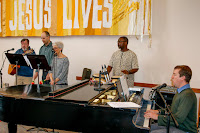 |
| Photo by Ron Houser |
What happened a few minutes later is a mystery. I still can't explain my first Communion; it made no sense. I was in tears and physically unbalanced: I felt as if I had just stepped off a curb, or been knocked over, painlessly, from behind. The disconnect between what I thought was happening—I was eating a piece of bread; what I heard someone else say was happening—the piece of bread was the “body” of “Christ,” a patently untrue, or at best metaphorical statement; and what I knew was happening—God, named “Christ” or “Jesus,” was real, and in my mouth—utterly short-circuited my ability to do anything but cry.
All the way home, shocked, I scrambled for explanations. Maybe I was hyper-suggestible, and being surrounded by believers had been enough to push me, momentarily, into accepting their superstitions: what I’d felt was a sort of contact high. My tears were probably just pent-up sadness, accumulated over a long hard decade, and spilling out, unsurprisingly, because I was in a place where I could cry anonymously. In fact, the whole thing must have been about emotion: the music, the movement and the light in the room had evoked feelings, much as if I’d been uplifted by a particularly glorious concert or seen a natural wonder.
Afterwards she thought to herself 'Now that you’ve taken the bread, what are you going to do?". The urgency of answering that question propelled her to start a food pantry that has literally given away tons of fruit and vegetables and cereal around the same altar where she had first received the body of Christ.
The other story was of Pastor Ray's personally returning to Christianity after years of feeling excluded, which was a chance meeting with a Lutheran pastor's wife who was dancing in a gay bar was in.
His sermon emphasized the doubt and fear of the disciples as stressing how Jesus can meet us wherever we are in our journey and that we do not need to be ashamed of any doubts or fears we harbor in our hearts about Jesus and what we may have to do.
When I read Take This Bread and when I heard the author give a keynote address at the Oregon Synod assembly in 2010 I was impressed by her words and how she stressed the disconnect between what she thought was happening and what someone else said was happening. That disconnect made her cry. This description invokes for me the moments where I have felt God's presence. I experience the world as I rationally encounter it every day and simultaneously experience God's presence which is just as immediate and just as "real". I was just as overcome with emotion when that happened, only I was given joy and emotional well-being instead of tears to express my gratitude.
Another important component of her life story was community. In the story above she described possibly being surrounded by believers was enough to push her, momentarily, into accepting their "superstitions". This is all about credulity and our tendency not to be too ready to believe that something is real or true. We view gullibility as a danger in our lives. Nobody wants to be open to a con.
So after all this Sunday worship threw me back to the messiness of resurrection that I wrote about throughout Holy Week.
The music today was all familiar to the congregation. We sang the African and American Folk Mass liturgy with Eric leading the congregation together with Matt, Valentine, Shirley and myself.




OS - Once the search is in progress something will be found.
ReplyDelete